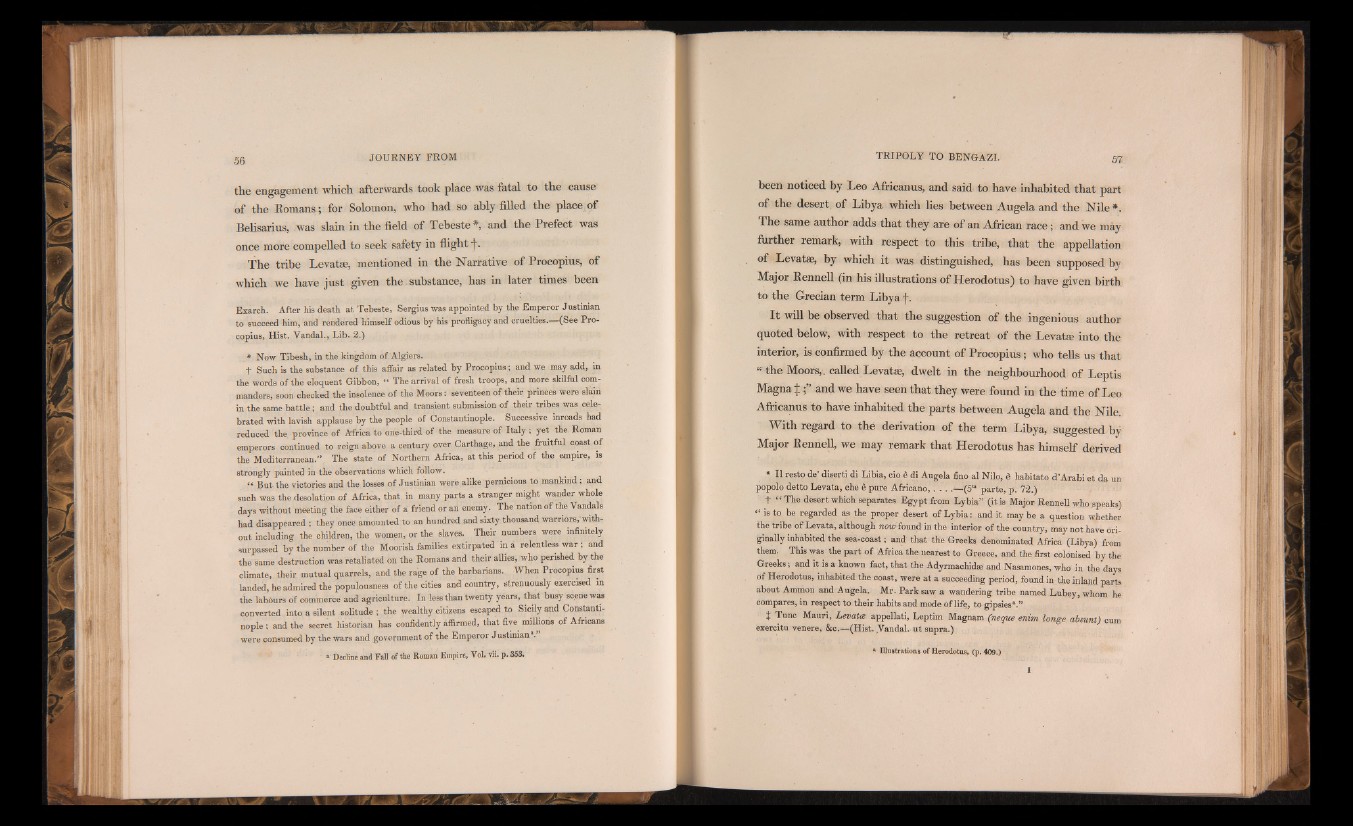
the engagement which afterwards took place was fatal to the .cause
of the Romans; for Solomon, who had so ably filled the place of
Belisarius, was slain in the field of Tebeste *, and the Prefect was
once more compelled to seek safety in flight j.
The tribe Levat®, mentioned in the Narrative of Procopius, of
which we have just given the substance, has in later times been
Exarch. After his death a t Tebeste, Sergius was appointed by the Emperor Justinian
to succeed him, and rendered himself odious by his profligacy and cruelties.—(See Pro-
copius, Hist. Vandal., Lib. 2.)
* Now Tjbesh, in the kingdom of. Algiers.
t Such is the substance of this affair as related by Procopius; and we may add, in
the words of the eloquent Gibbon, “ The arrival of fresh tro o p , and more skilful commanders,
soon checked the insolence of the Moors: seventeen of their princes were slain
in the same b a ttle ; and the doubtful and transient submission of their tribes was celebrated
with lavish applause by the people of Constantinople. Successive inroads had
reduced the. province of Africa to one-third of the measure o f Ita ly ; yet the Roman
emperors continued to reign above a century over Carthage, and the fruitful coast of
the Mediterranean.” The state' o f Northern Africa, at this period of the empire, is
strongly painted in the observations which follow.
“ B u t the victories and the losses of Justinian were alike pernicious to mankind; and
such was the .desolation o f Africa, that in many parts a stranger might wander whole
days without meeting the face either of á friend or ah enemy. The nation of the Vandals
had disappeared ; they once amounted to an hundred, and sixty thousand warriors, without
including the children, the women, or the slaves. Their numbers were infinitely
surpassed by the number of the Moorish families extirpated in i relentless war ; and
the same destruction was retaliated on the Romans and their allies, who perished by the
climate, , their mutual quarrels, and the rage of the barbarians. When Procopius first
l a n d e d , h e admired the populousness of the cities and country, strenuously exercised in
the labours of commerce and agriculture. In less than twenty years, that busy scene was
converted into a silent solitude ; the wealthy citizens escaped to Sicily and Constantinople
; and the secret historian has confidently affirmed, that five millions of Africans
were consumed by the wars and government of the Emperor Justinian*.
» Decline and Pall of the Roman Empire, Vol. vii. p. 353.
been noticed by Leo Africanus, and said to have inhabited that part
of the desert, of Libya which lies between Augela and the Nile *.
The same author adds that they are of an African race ; and we may
further remark, with respect to this tribe, that the appellation
of Levatæ, by which it was distinguished, has been supposed by
Major Rennell (in his illustrations of Herodotus) to have given birth
to the Grecian term Libya f .
I t will be observed that the suggestion of the ingenious author
quoted below, with respect to the retreat of the Levatæ into the
interior, is confirmed by the account of Procopius ; who tells us that
“ the Moors,, called Levatæ, dwelt in the neighbourhood of Leptis
Magna J ; ” and we have seen that they were found in the time of Leo
Africanus to have inhabited the parts between Augela and the Nile.
With regard to thé derivation of the term Libya, suggested by
Major Rennell, we may remark that Herodotus has himself derived
* I l resto de’ diserti di Libia, cio è di Augela fino al Nilo, è habitato d ’Arabi e t da un
popolo detto Levata, che è pure Africano —(5* parte, p . 72.)
t “ The desert which separates Egypt from Lybia’’ (it is Major Rennell who speaks)
“ is to be regarded as the proper desert of Lybia; and it may be a question whether
ihe tribe of Levata, although now found in the interior of the country, may not have originally
inhabited the sea-coast ; and that the Greeks denominated Africa (Libya) from
them. This was the part o f Africa the nearest to Greece, and the first colonised by the
Greeks ; and it is a known fact, th a t the Adyrmachidæ and Nasamones, who in the days
of Herodotus, inhabited the coast, were a t a succeeding period, found in the inland parts
about Ammon and Augela. Mr. Park saw a wandering tribe named Lubey, whom he
compares, in respect to their habits and mode o f life, to gipsies*.”
t Tunc Mauri, Levatæ appellati, Leptim Magnam (neque enim longe absunt) cum
exercitu venere, &c;—(Hist. .Vandal, ut supra.)
* Illustrations of Herodotus, (p. 409.)